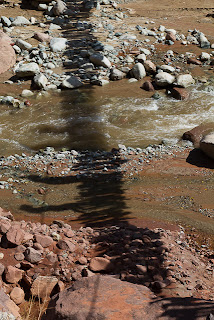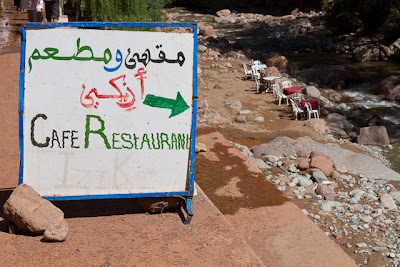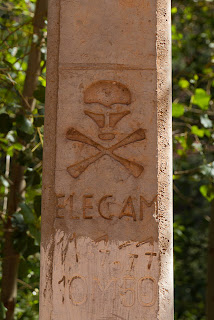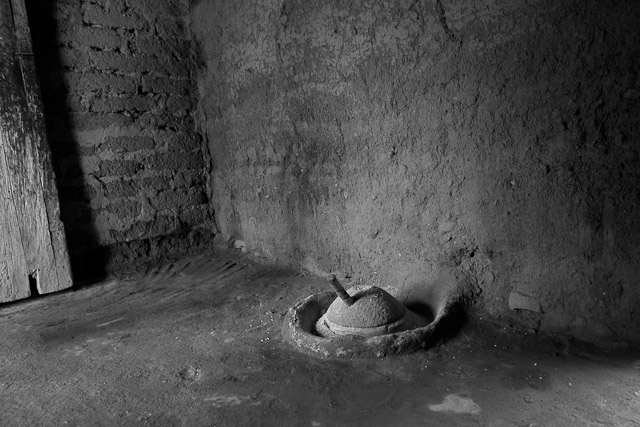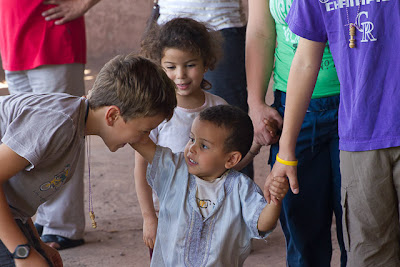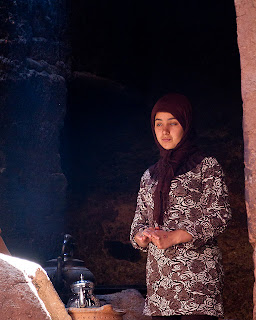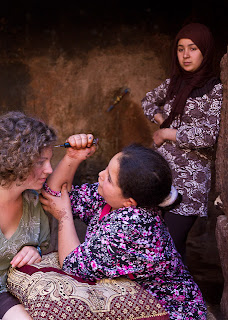 After a quick euro-breakfast at the hotel, we were off on the bus to head up into the Ourika Valley of the Atlas Mtns. to see how the Berber people lived. From Casablanca the terrain resembles a dry California or Nevada, with occasional stands of cacti, bearing the yellow-orange fruit that we tried in the souks of Marrakesh. About halfway to Marrakesh it becomes more fertile, water obviously underground, emanating from the mountains now immediately in front of us, the highest of which (Jebel Toubkal, at >13,000′) is the third highest on the African continent. Marrakesh, being an oasis, has relatively ample water from the mountains, but is quite warm. Now above Marrakesh, the road winding southwest into the mountains took us up to about 4000′ MSL, to the last point a bus could u-turn for apparently hundreds of kilometers.
After a quick euro-breakfast at the hotel, we were off on the bus to head up into the Ourika Valley of the Atlas Mtns. to see how the Berber people lived. From Casablanca the terrain resembles a dry California or Nevada, with occasional stands of cacti, bearing the yellow-orange fruit that we tried in the souks of Marrakesh. About halfway to Marrakesh it becomes more fertile, water obviously underground, emanating from the mountains now immediately in front of us, the highest of which (Jebel Toubkal, at >13,000′) is the third highest on the African continent. Marrakesh, being an oasis, has relatively ample water from the mountains, but is quite warm. Now above Marrakesh, the road winding southwest into the mountains took us up to about 4000′ MSL, to the last point a bus could u-turn for apparently hundreds of kilometers.
 |
| A tajine stand. |
 |
| One of many loudspeakers that could be seen in virtually any community, used by the imam for the 5-times daily call to prayer. |
We then moved on to the highlight of the day, a more formal visit with a Berber family who allowed the 20+ of us to wander about their home. Although spartan to say the least (mud walls, dirt floors all around, no doors, some rooms open to the elements), they have everything they need, including a constant water source provided by one of the many ditches and canals emanating from the river to convey water to different places. They had a cow and a chicken in what would be ‘our’ basement, a dunkey outside, and a few cats less feral-looking than most of those we saw roaming the streets of Casablanca.
 |
| The water conveyance outside the Berber home we visited. |
 |
| Mohammed. |
 |
| A neighbor boy looks for handouts through the wall. He fled when one of the girls in the home we were visiting threw water on him from above. |
 |
| Typical room interior. |
 |
| A water jug about 2 feet high, made of old tires. |
 |
| The kitchen, where the water was being boiled for tea. |
It became time to go and people said their goodbyes, many offering “Shukran”, thank you in Arabic. Such a fascinating little slice of life, one that we in the U.S. can scarcely imagine being our daily reality. This family seemed at least as happy as most I know back home, seeming to have what they need, and be thankful for it.

